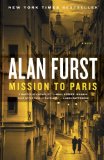Summary | Excerpt | Reading Guide | Reviews | Beyond the book | Read-Alikes | Genres & Themes | Author Bio

A Novel
by Dan VyletaUpon spying a female neighbor, Dr. Anton Beer - the main character in Dan Vyleta's novel, The Quiet Twin - muses that she "seemed half child, half village tart. Another sort of man... might long have contrived to hasten the transformation." It's only human nature to believe Beer; we have no reason not to believe him, although his observation creates an element of doubt. It leads us to ask: What kind of man is he? Is he honorable? Lustful? Maybe both? Although ostensibly a murder mystery, the deaths in The Quiet Twin pale in comparison to the intrigue created by Vyleta's characters, all struggling for survival under the threat of Nazi persecution, all with something to hide.
The setting is Vienna, when World War II "was six weeks old, and glorious; Austria a proud part of the Reich." However, fear looms around the apartment building where Beer lives. A series of murders attributed to an unknown serial killer rack the neighborhood, and Beer is drawn into the investigation after Herr Speckstein, the zellanwart, or neighborhood spy, requests his assistance. Speckstein's beloved dog, Walter, has been butchered, which leads Speckstein to believe that he is the ultimate target. The dog's evisceration draws the police to their apartment building, and no one, especially not Beer, wants that. Not in a Nazi society where "purity" is prized, and everyone has an impurity to hide. The essence of this fear is established early with Beer's tour of an abandoned, vandalized Jewish home. It's an apocalyptic urbanscape that presages their fate as a society and evokes the terror in which they all live.
It's an intriguing set up for a mystery, but The Quiet Twin is not without its foibles. It's populated with a mishmash of European nationalities and too many characters who are, for a wide range of reasons, targeted by the Nazis. So much so that it is, at times, overwhelming. Beer himself observes that "if this was a detective yarn... there [would be] too many suspects... A reader cannot remember more than two or three."
However, rather than focusing on the guilt or innocence of the mass of suspects, Vyleta slowly unveils his main characters, doling out morsels of each as he shifts suspicion throughout the building's occupants. The controlled stripping away of their facades is almost erotic as Vyleta teases with a little peek at one, then moves to another. It's a slow seduction of the reader and an engrossing character study of a group of individuals struggling to survive during "uncharitable times." The author elicits a smorgasbord of human emotions as he penetrates the veneer that his characters must construct in the name of self-preservation. Lust, fear, anger, love, happiness, and depression are all offered by his multidimensional - and sometimes contradictory - characters.
As a mystery, The Quiet Twin is subdued; Vyleta's periodic allusions to the murders become little more than a vehicle to propel the plot along. The killer of Speckstein's dog is ultimately revealed - Vyleta leaves no loose ends there - but the finish is somewhat abrupt, and the author chooses to review the fate of all the characters in a conclusion that is a bit too tidy given the pall of fear that hangs over this impure menagerie. Their fear is of their own government, not a serial killer, though ultimately they would discover that there is no difference between the two. The characters are the real story in The Quiet Twin - there is no mystery greater than a human being.
![]() This review
first ran in the March 14, 2012
issue of BookBrowse Recommends.
This review
first ran in the March 14, 2012
issue of BookBrowse Recommends.

If you liked The Quiet Twin, try these:

by Robert Seethaler
Published 2025
A vibrant tale of love, companionship, and renewal set against the transformations of 1960s Vienna.

by Alan Furst
Published 2013
From Alan Furst, the bestselling author, often praised as the best spy novelist ever, comes a novel that's truly hard to put down. Mission to Paris includes beautifully drawn scenes of romance and intimacy, and the novel is alive with extraordinary characters.
When all think alike, no one thinks very much
Click Here to find out who said this, as well as discovering other famous literary quotes!
Your guide toexceptional books
BookBrowse seeks out and recommends the best in contemporary fiction and nonfiction—books that not only engage and entertain but also deepen our understanding of ourselves and the world around us.